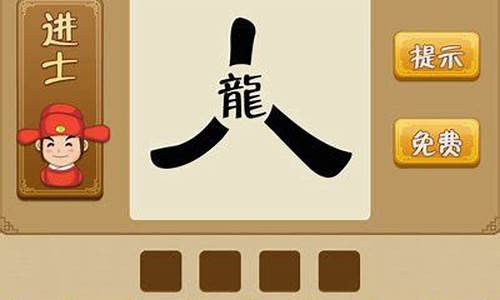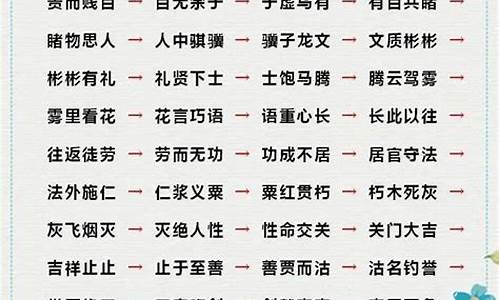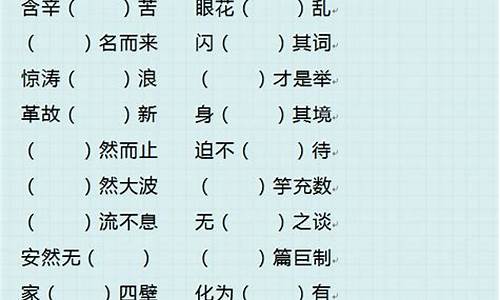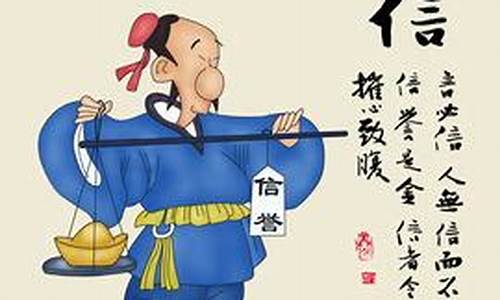您现在的位置是: 首页 > 成语典故大全 成语典故大全
关于成语故事的英语作文_关于成语故事的英语作文80词
ysladmin 2024-06-08 人已围观
简介关于成语故事的英语作文_关于成语故事的英语作文80词 现在,请允许我来为大家详细解释一下关于成语故事的英语作文的问题,希望我的回答能够帮助到大家。关于关于成语故事的英语作文的讨论,我们正式开始。1.简单四字成语英文版2
现在,请允许我来为大家详细解释一下关于成语故事的英语作文的问题,希望我的回答能够帮助到大家。关于关于成语故事的英语作文的讨论,我们正式开始。
1.简单四字成语英文版
2.有没有翻译英文的朋友啊?求一英语作文成语故事
3.我急需中国成语英文小故事(中英对照)谢谢啦
4.有没有关于成语故事方面的英文阅读?
5.《叶公好龙》的成语故事中英文版
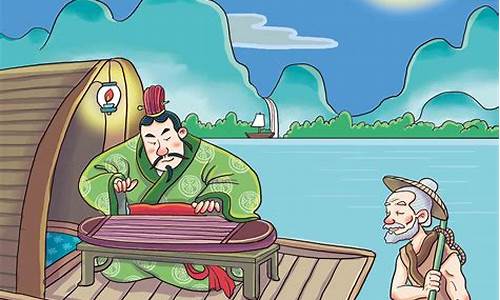
简单四字成语英文版
1. 简洁的成语故事(英文版)
郑人买履(A man from the State of Zheng bought shoes)Once upon a time , a man in the State of Zheng went to the market to buy a pair of shoes. Before he left for the market, he had measured his feet with a piece me straw. However , he couldn't find the measurement because he had left it at home . So he had to say sorry to the owner that he had to go home for it, which confused the owner why he didn't try the shoes on with his own feet . The man *** iled to the owner , " I would rather believe in the measuremens than my own feet."。
2. 英语的四字成语keep somebody at arm's length, 形影不离
be on one's back, 卧病在床
make somebody's blood boil, 热血沸腾
Keep one's shirt on, 忍辱负重
Shout something from the rooftops , 登高而呼
Be all ears, 洗耳恭听
out of the blue, 猝不及防
at sixes and sevens, 乱七八糟
A bolt from the blue 晴天霹雳
love you love your dog 爱屋及乌
a bad apple, 金玉其外,败絮其中
It rains dogs and cats.倾盆大雨
Fish in trouble water.混水摸鱼
Teach fish to swim.班门弄斧
Beat the dog before the lion.杀鸡敬猴
3. 英语的四字词语繁荣昌盛thriving and prosperous爱不释手fondle admiringly爱财如命skin a flea for its hide爱屋及乌love me, love my dog. He that loves the tree loves the branch恨屋及乌:He who hates Peter har his dog.)安居乐业live and work in peace and contentment白手起家build up from nothing / build up from scratch /start from scratch百里挑一one in a hundred / the cream of the crop百折不挠be indomitable半途而废give up halfway leave sth. Unfinished包罗万象all-embracing all-inclusive饱经风霜weather-beaten卑躬屈膝bow and scrape cringe悲欢离合vicissitudes of life背道而驰run counter to run in the opposite direction本末倒置put the cart before the horse笨鸟先飞the slow need to start early必由之路the only way闭关自守close the country to international intercourse变本加厉be further intensified变化无常chop and change fantasticality 变化无常chop and change fantasticality别开生面having sth. New别有用心have ulterior motives彬彬有礼refined and courteous urbane兵不厌诈in war nothing is too deceitful博古通今erudite and informed不败之地incincible position不耻下问feel not ashamed to learn from one's subordinates不可救药be past praying for beyond redemption不劳而获reap where one has not sown不屈不挠fortitude indefatigability perseverance persevere tenacity不速之客crasher uninvited guest不同凡响outstanding不言而喻speak for itself tell its own story tell its own tale went without saying不遗余力spare no effort spare no pains不以为然not approve object to不义之财filthy lucre filthy pelf the mammon of unrighteousness不亦乐乎extremely不远千里go to the trouble of travelling a long distance不约而同happen to coincide不择手段by any kind of means by hook or crook play hard by fair means or foul不知所措be at a loss be all adrift lose one's head out of one's wits才疏学浅have little talent and learning惨绝人寰extremely cruel沧海桑田time brings a great change to the worlds沧海一粟/九牛一毛a drop in the bucket草木皆兵a state of extreme nervousness层出不穷emerge in endlessly。
4. 英语的四字成语优质解答keep somebody at arm's length,形影不离 be on one's back,卧病在床 make somebody's blood boil,热血沸腾 Keep one's shirt on,忍辱负重 Shout something from the rooftops ,登高而呼 Be all ears,洗耳恭听 out of the blue,猝不及防 at sixes and sevens,乱七八糟 A bolt from the blue 晴天霹雳love you love your dog 爱屋及乌 a bad apple,金玉其外,败絮其中It rains dogs and cats.倾盆大雨 Fish in trouble water.混水摸鱼 Teach fish to swim.班门弄斧 Beat the dog before the lion.杀鸡敬猴。
有没有翻译英文的朋友啊?求一英语作文成语故事
During the Spring and Autumn period (770-476BC), the State of Wu launched an attack against the State of Yue. The King of Wu was seriously wounded and soon died. His son Fu Chai became the new King. Fu was determined to get revenge. He drilled his army rigidly until it was a perfect fighting force. Three years later, he led his army against the State of Yue and caught its king Gou Jian. Fu took him to the State of Wu.
春秋时期,吴国和越国之间进行了一场战争,吴王不幸受了重伤,不久就死了。他的儿子夫差作了吴国的新国王,他发誓要替父亲报仇。于是,他严格的.操练他的士兵,把他们训练成了一支非常厉害的军队。三年以后,他对越国发动了战争,抓住了越王勾践,把他带回了吴国。
In order to avenge his father's death, Fu let him live in a shabby stone house by his father's tomb and ordered him to raise horses for him. Gou pretended to be loyal to Fu but he never forgot his humiliation. Many years later, he was set free. Gou secretly accumulated a military force after he went back to his own state. In order to make himself tougher he slept on firewood and ate a gall-bladder before having dinner and going to bed every night. At the same time he administered his state carefully, developing agriculture and educating the people. After a few years, his country became strong. Then Gou seized a favorable opportunity to wipe out the State of Wu.
为了复仇,夫差让勾践住在他父亲墓旁的破石屋里天天看墓、喂马。勾践表面上服从,心里面却想着复仇。几年以后,勾践被放回越国。他立刻开始秘密聚集一支军队。为了提醒自己不要忘了报仇,他睡在柴上,还每天在吃饭睡觉前尝一尝苦胆。同时,他专心治理国家,大力发展农业,加强民众教育。几年后,越国又变得强大起来,然后,勾践抓住一个适当的机会消灭了吴国。
Later, people use it to describe one who endures self-imposed hardships to strengthen one's resolve to realize one's ambition.
后来,人们用它来形容人刻苦自励以达到自己定下的目标。
我急需中国成语英文小故事(中英对照)谢谢啦
塞翁失马Blessing or Bane
战国时期,靠近北部边城,住着一个老人,名叫塞翁。塞翁养了许多马,一天,他的马群中忽然有一匹走失了。邻居们听说这件事,跑来安慰,劝他不必太着急,年龄大了,多注意身体。塞翁见有人劝慰,笑了笑说:“丢了一匹马损失不大,没准会带来什么福气呢。”
邻居听了塞翁的话,心里觉得很好笑。马丢了,明明是件坏事,他却认为也许是好事,显然是自我安慰而已。过了几天,丢失的马不仅自动返回家,还带回一匹匈奴的骏马。
邻居听说了,对塞翁的预见非常佩服,向塞翁道贺说:“还是您有远见,马不仅没有丢,还带回一匹好马,真是福气呀。”
塞翁听了邻人的祝贺,反而一点高兴的样子都没有,忧虑地说:“白白得了一匹好马,不一定是什么福气,也许惹出什么麻烦来。”
邻居们以为他故作姿态纯属老年人的狡猾。心里明明高兴,有意不说出来。
塞翁有个独生子,非常喜欢骑马。他发现带回来的那匹马顾盼生姿,身长蹄大,嘶鸣嘹亮,膘悍神骏,一看就知道是匹好马。他每天都骑马出游,心中洋洋得意。
一天,他高兴得有些过火,打马飞奔,一个趔趄,从马背上跌下来,摔断了腿。邻居听说,纷纷来慰问。
塞翁说:“没什么,腿摔断了却保住性命,或许是福气呢。”邻居们觉得他又在胡言乱语。他们想不出,摔断腿会带来什么福气。
不久,匈奴兵大举入侵,青年人被应征入伍,塞翁的儿子因为摔断了腿,不能去当兵。入伍的青年都战死了,唯有塞翁的儿子保全了性命。
Near China's northern borders lived a man well versed in the practices of Taoism. His horse, for no reason at all, got into the territory of the northern tribes. Everyone commiserated with him.
"Perhaps this will soon turn out to be a blessing," said his father.
After a few months, his animal came back, leading a fine horse from the north. Everyone congratulated him.
"Perhaps this will soon turn out to be a cause of misfortune," said his father.
Since he was well-off and kept good horses his son became fond of riding and eventually broke his thigh bone falling from a horse. Everyone commiserated with him.
"Perhaps this will soon turn out to be a blessing," said his father.
One year later, the northern tribes started a big invasion of the border regions. All able-bodied young men took up arms and fought against the invaders, and as a result, around the border nine out of ten men died. This man's son did not join in the fighting because he was crippled and so both the boy and his father survived.
有没有关于成语故事方面的英文阅读?
成语故事,中英文对照
惊弓之鸟
Birds Startled by the Mere Twang of a Bowstring
战国时期(公元前403―221年中国中原地区各诸侯国连年争战的时代)魏国有个名叫更羸的人。一天,他对国王说:“我只要拉开弓,空射一下,就能把天上的鸟射下来。”国王不相信。更羸便对准天上飞来的一只雁射去,果真那只雁听到拉弦的声音就掉了下来。国王感到很奇怪。更羸说,“那是一只受过伤的雁。它一听到我拉开弓弦的声响,就惊慌得支持不住,自然要掉下来了。”
In the Warring States Period, there was a man in the State of Wei called Geng Lei. One day he said to the king: 'I can shoot down birds by simply plucking my bowstring.' When the king expressed doubt, Geng Lei pointed his bow at a wild goose flying in the sky, twanged the bowstring, and the goose fell to the ground. Geng Lei said, 'This goose has been hurt in the past. Hearing the twang of the bowstring, it assumed that it was doomed. So it simply gave up trying to live.'
“惊弓之鸟”这个成语比喻受过惊恐之后,有一点动静就特别害怕。
This idiom means that if one has been frightened in the past one's will may become paralysed in a similar situation.
毛遂自荐
Mao Sui Recommending Himself
战国时代,秦国军队攻打赵国的都城。赵国的平原君打算亲自到楚国去请救兵,想挑选一个精明能干的人一同前去。有一个名叫毛遂的人,自告奋勇愿意同去。平原君到楚国后,与楚王谈了半天,没有一点结果。毛遂怒气冲冲地拿着宝剑,逼近楚王,终于迫使楚王答应出兵,与赵国联合共同抵抗秦国。
In the Warring States Period, the State of Qin besieged the capital of the State of Zhao. Duke Pingyuan of Zhao planned to ask the ruler of the State of Chu personally for assistance. He wanted to select a capable man to go with him. A man called Mao Sui volunteered. When the negoti-actions between the two states were stalled because the ruler of Chu hesitated to send troops, Mao Sui approached him, brandishing a sword. At that, the ruler of Chu agreed to help Zhao, against Qin.
“毛遂自荐”这个成语用来比喻自己推荐自己,不必别人介绍。
This idiom means to recommend oneself.
世外桃源
A Haven of Peace and Happiness
东晋的文学家陶渊明写了一片著名的文章叫《桃花源记》。叙述一个渔人出外捕鱼的时候,偶然来到了桃花源这个地方。从这里通过一个山洞,发现了一个村子,这里的居民是秦朝时避难人的后代。这是一个与世隔绝、没有剥削和压迫、人人安居乐业的美好社会。渔人告别村民回家以后,再也找不到这个地方了。
Tao Yuanming, a famous writer of the Eastern Jin Dynasty (317-420), wrote the well-known essay Peach-Blossom Spring. In it he tells a story which goes like this: A fisherman happened to come upon a place called Peach-Blossom Spring. Squeezing through a cave, he found a village, the residents of which were descendants of refugees from the Qin Dynasty. It was a paradise isolated from the outside world, without exploitation or oppression, and everybody living and working in peace and contentment. The fisherman left the villagers and went home. But he could never find the place again.
后来,由这个故事产生了“世外桃源”这个成语,用来比喻与世隔绝的、理想的美好世界。
This idiom is derived from the above story, and is used to mean an isolated, ideal world.
南辕北辙
Going South by Driving the Chariot North
从前有个人要到南方去,他坐的车子却向北方行驶。过路人说:“你去南方,车子怎么向北行驶呢?”他回答说:“我的马很能跑路,我的车夫驾车的技术也很高明,加上我又带了充足的路费。”这个人没有考虑到,方向弄反了,他的条件越好,离他要去的地方就越远。
Once a man wanted to go to the south, but his carriage was heading north. A passer-by asked him: 'If you are going to the south, why is your chariot heading north? ' The man answered, 'My horse is good at running, my driver is highly skilled at driving a carriage, and I have enough money. ' The man didn't consider that the direction might be wrong; the better his conditions were, the further he was away from his destination.
后来人们就把这个故事概括为“南辕北辙”,比喻一个人的行为和他的目的正好相反。
The idiom derived from this story indicates that one's action was the opposite effect to one's intention.
画龙点睛
Putting the Finishing Touch to the Picture of a Dragon
南北朝(公元420--589)时期,有个画家叫张僧繇。有一次,他到一个寺庙去游玩,在墙壁上面画了四条龙,可是都没有画出眼睛。看画的人觉得很奇怪,问他为什么不画出眼睛。他说:“眼睛是龙的关键,画上眼睛,龙就会飞走了。”大家不相信他说的话。张僧繇拿起笔来,刚给两条龙点上眼睛,立刻电闪雷鸣,两条龙飞向天空,墙上只剩下两条没有画眼睛的龙。
In the Southern and Northern Dynasties Period (420-589), there was a painter called Zhang Sengyou. Once he visited a temple and painted on the wall four dragons, but gave none of them eyes. The onlookers felt that this was odd, and asked why he hadn't painted the eyes. He answered, 'Eyes are crucial for dragons. With the eyes painted on, the dragons would fly away.' Nobody believed this, so Zhang Sengyou took up his brush and added eyes to two of the dragons. No sooner had he finished than the two dragons flew into the sky amid a thunderstorm. The two without eyes stayed painted on the wall.
“画龙点睛”这个成语用来比喻讲话或写文章时,在关键地方加一两句重要的话,使内容更加生动有力。
This idiom is used to describe how, when writing or speaking, one or two key sentences will enhance the contents.
画蛇添足
Drawing a snake and Adding Feet
战国时代有个楚国人祭他的祖先。仪式结束后,他拿出一壶酒赏给手下的几个人。大家商量说:“我们都来画蛇,谁先画好谁就喝这壶酒。”其中有一个人先画好了。但他看到同伴还没有画完,就又给蛇添上了脚。这时,另一个人也画好了,夺过酒壶吧酒喝了,并且说:“蛇本来是没有脚的,你怎么能给它添上脚呢?”
In the Warring States Period, a man in the State of Chu was offering a sacrifice to his ancestors. After the ceremony, the man gave a beaker of wine to his servants. The servants thought that there was not enough wine for all them, and decided to each draw a picture of a snake; the one who finished the picture first would get the wine. One of them drew very rapidly. Seeing that the others were still busy drawing, he added feet to the snake. At this moment another man finished, snatched the beaker and drank the wine, saying, 'A snake doesn't have feet. How can you add feet to a snake? '
“画蛇添足”这个成语比喻做了多余而不恰当的事,反而把事情弄糟了。
This idiom refers to ruining a venture by doing unnecessary and surplus things.
班门弄斧
Showing Off One's Proficiency with the Axe Before Lu Ban the Master Carpenter
古代有一个建筑和雕刻技术非常高超的人,名叫鲁班,木匠行里尊称他为祖师。传说他曾用木头制作了一只五彩斑斓的凤凰,能够在空中飞翔三天不掉下来。在鲁班门前摆弄斧子,当然显得有些自不量力了。
Lu Ban was supposed to be a consummate carpenter in ancient times. It is said that he once carved a wooden phoenix that was so lifelike that it actually flew in the sky for three days. Thus it was considered the height of folly to show off one's skill with an axe in front of Lu Ban.
“班门弄斧”这个成语,用来比喻在行家面前显示本领。
This idiom excoriates those who show off their slight accomplishments in front of experts.
可爱多 2005-6-13 08:38
怒发冲冠
So Angry That One' s Hair Lifts Up One' s Hat
战国时代,赵国的大臣蔺相如出使到秦国。在他向秦王索回玉璧的时候,秦王蛮不讲理,蔺相如气愤得连头发都竖了起来,向上冲着帽子。
In the Warring States Period, Lin Xiangru, chief min-ister of the State of Zhao, was sent as an envoy to the State of Qin to ask the ruler of Qin to return a fine piece of jade to Zhao. But the ruler of Qin was rude and unreasonable. Lin was angry, and his hair stood up so stiffly on his head that it lifted up his hat.
后来人们用“怒发冲冠”这个成语形容人愤怒到了极点。
This idiom came to be used to mean being extremely angry.
画饼充饥
Allaying Hunger with Pictures of Cakes
三国时代魏国的皇帝曹睿,准备选拔一个有才能的人到朝廷来做官。曹睿对他的大臣说:“选择人才,不能光找有虚名的人。虚名好像是在地上画的一块饼,只能看,不能解决肚子饥饿的问题啊!”
In the Three Kingdoms Period (220-280), the king of the Wei, Cao Rui, wanted to select a very capable man to work for him. He said to his ministers: 'When choosing a talented person, always beware of one with a false reputation. A false reputation is just like a picture of a cake; it can' t relieve hunger.'
后来人们就用“画饼充饥”这个成语比喻用空想安慰自己,不能解决实际问题。
Later, this idiom came to be used to mean comforting oneself with unrealistic thoughts, without solving practical problems.
一鸣惊人
Amazing the World with a Single Feat
战国时代,齐威王即位后做了三年国君,只顾享乐,不理政事。有个善于说笑话的人叫淳于髡,一天对齐威王说:“城里有一只大鸟,三年不飞也不叫,你知道这是什么道理?”齐威王说:“这鸟不飞则罢,一飞就冲天;不鸣则罢,一鸣就惊人。”在淳于髡的激发下,齐威王开始治理国家,取得很大成绩,齐国的声威一直保持了几十年。
In the Warring States Period, Duke Wei of Qi neglected state affairs, for the first three years of his reign, giving himself over to dissipation. One of his ministers, Chun Yukun who had a good sense of humour, said to him: 'There is a big bird which has neither taken wing nor sung for three years.' The duke answered, 'Once that bird starts to fly and sing, it will astonish the world.' The duke thereupon devoted himself to his duties and built his state up into a powerful one.
“一鸣惊人”用来表示平时默默无闻,一旦行动起来,却做出惊人的成绩。
This idiom is used to indicate that a person may rise from obscurity and achieve greatness.
株待兔
Sitting by a Stump, Waiting for a Careless Hare
春秋时代,宋国有个农夫,一天在耕田的时候,忽然跑来一只兔子,恰巧碰在树桩上,脖子折断死了。农夫把兔子拾回家去,美美地吃了一顿兔肉。晚上他想:“我何必辛辛苦苦地种地呢?每天在树下能捡到一只兔子就够我吃的了。”于是,他从此不再耕作,每天坐在树下等待兔子的到来。
In the Spring and Autumn Period, a farmer in the State of Song was one day working in the fields when he saw a rabbit bump into a tree stump accidentally and break its neck. The farmer took the rabbit home, and cooked himself a delicious meal. That night he thought, 'I needn't work so hard. All I have to do is wait for a rabbit each day by the stump.' So from then on he gave up farming, and simply sat by the stump waiting for rabbits to come and run into it.
“守株待兔”这个成语,讥笑那些不想经过努力,存在侥幸心理,希望得到意外收获的人。
This idiom satirizes those who just wait for a stroke of luck, rather than making efforts to obtain what they need.
Zengzi Slaughters a Pig
曾子杀彘
engzi’s wife was going to the market. Her little son insisted on going with her, making a tearful scene. “Stay at home,” she said to the boy. “When I come back, I will slaughter a pig for you.” When she came back, Zengzi got ready to slaughter the pig. His wife stopped him, saying: “I was just kidding.” “A child is not to be kidded like that!” he replied. “A child does not know much and cannot judge for himself. He learns from his parents and listens to what they day. To lie to him is to teach him to lie to others. If a mother lies to her son, he will not trust her anymore. How is she then to educate him?” With that Zengzi went to slaughter the pig and prepare a good meal for their son.
曾子的妻子到集市上去, 他的儿子哭着要跟去. 他的母亲说: “你回家呆着,待会儿我回来杀猪给你吃.” 她刚从集市上回来, 曾子就要捉猪去杀. 妻子劝止他说: “只不过是跟孩子开玩笑罢了.” 曾子说: “不能跟孩子开玩笑啊! 小孩子没有思考和判断能力, 要想父母亲学习, 听从父母的教导. 现在你欺骗他,这是教孩子骗人啊! 母亲欺骗儿子, 儿子就不再相信自己的母亲了, 这不是实现教育的方法.” 于是曾子就杀猪煮肉给孩子吃.
狐假虎威
Basking in Reflected Glory
老虎在山林里捉到了一只狐狸,要吃掉它。狐狸连忙说:“你不能吃我,我是天帝派来统治百兽的。你要吃了我,就违抗了天帝的命令。你不信,就跟我到山林里去一趟,看百兽见了我是不是都很害怕。”老虎相信了狐狸的话,就跟在狐狸的后面走进山林。百兽见了果然都纷纷逃命。老虎以为百兽真的害怕狐狸而不知道是害怕自己,于是就把狐狸给放了。
A tiger caught a fox in a forest, and was just about to eat it, when the fox said, 'You mustn't eat me. I was sent by Heaven to rule the animals. By eating me, you will violate the command of Heaven. If you don't believe me, just follow me to see whether the animals are afraid of me.' The tiger agreed, and followed the fox as it walked around the forest. The animals all ran away on seeing them. The tiger thought they were afraid of the fox, so he let it go. He didn't realise that it was him that the beasts were really afraid of.
“狐假虎威”这个成语用来比喻倚仗别人的势力去欺压人或吓唬人。
This idiom means relying on another's power to bully or frighten others.
破镜重圆
A Broken Mirror Made Whole Agian
南朝陈国(公元557-589)将要灭亡的时候,驸马徐德言把一面铜镜破开,跟妻子各留下一半。双方约定:如果将来夫妻失散了,就把它当作信物。后来,夫妻二人真的失散了,凭借着各人留下的半面镜子,他们最终又得到团圆。
In the Northern and Southern Dynasties when the State of Chen (A.D. 557-589) was facing its demise, Xu Deyan, husband of the princess, broke a bronze mirror into halves. Each of them kept a half as tokens in case they were separated. Soon afterwards, they did lose touch with each other, but the two halves of the mirror enabled them to be reunited.
“破镜重圆”这个成语比喻夫妻失散或分离后重新团聚。
This idiom is used to refer to the reunion of a couple after they lose touch or break up.
一鼓作气
Rousing the Spirits with the First Drum Roll
春秋时代,齐国派兵攻打鲁国。鲁国的国王鲁庄公带着谋士曹刿指挥作战。齐军第一次击鼓以后,鲁军准备发起进攻。曹刿说:“不行。”齐军三次击鼓以后,曹刿才说:“现在可以进攻了。”结果齐军大败。战斗结束后,鲁庄公问曹刿胜利的原因。曹刿说:“打仗要考勇气。第一次击鼓,士气十分旺盛;第二次击鼓,士气有些衰落;第三次击鼓,士气就消耗尽了。敌人士气耗尽,我们发起进攻,所以取得了胜利。”
During the Spring and Autumn Period, an army from the State of Qi confronted one from the State of Lu. After the first roll of drums from the Qi side to summon Lu to battle, the Lu ruler wanted to attack. But his counsellor Cao Gui said, 'We should wait until the third drum roll, sire.' After the Qi side had beaten the drums three times, the Lu army attacked and defeated the Qi army. After the battle, the king asked Cao Gui the reason for his odd advice. Cao Gui answered, 'Fighting needs spirit. Their spirit was aroused by the first roll or the drums, but was depleted by the second. And it was completely exhausted by the third. We started to attack when their spirit was exhausted. That's why we won.'
后来,“一鼓作气”形容鼓起劲头,一下子把事情干完。
This idiom later meant to get something done with one sustained effort.
《叶公好龙》的成语故事中英文版
Adding Feet to a Snake 故事 画蛇添足
One day, Mr. Lion holds a party. Many animals come and drink a lot of wine. At last there is a pot of wine. Who can drink it? They drink out an idea and decide to have a match-Draw a snake. If you finish first, you can get it.
Soon Mr.Wolf finishes drawing. “Yeah, I’ve finished. I’m No.1,” he says. But he draws again and says, “Oh, let me add feet and my snake.” At the time, Mr. Gorilla also finishes. He takes away the pot of wine and drinks, then he says, “That isn’t a snake. Snakes have no feet. I get the wine.”
Covering One’s Ears While Stealing a Bell 故事 掩耳盗铃
Mr. Wang thinks he is clever, but he always does foolish things.
One day he sees a beautiful bell at the top of a door. “Oh! How nice! I will take it home.” He thinks, “What can I do?” After a while he has a “good” idea. “Aha! I have an idea now. I can plug my ears. Then I will not hear the ring when I take off the bell.”
Then he does so. But as soon as he takes off the bell, the owner opens the door. “What ate you doing?” the owner says angrily.
叶公好龙,汉语成语,比喻口头上说爱好某事物,实际上并不真爱好。以下是我精心整理的《叶公好龙》的成语故事中英文版,欢迎大家借鉴与参考,希望对大家有所帮助。
There is a young man, Lord Ye. He likes dragons vey much. He draws many dragons in his house. The house becomes a world of dragon.
A red dragon hears of Lord Ye, and is deeply moved. He wants to visit Lord Ye and makes a friend with him.
“Hi, Mr. Ye! Nice to meet you,” the real dragon comes to visit Mr. Ye runs away as fast he can. “Oh, my God! Help! Help!” he runs and shouts.”
有个年轻人,姓叶,非常喜欢龙.他在屋里里面了许多许多龙。
这屋子都快成了龙的世界。一龙真龙听说了叶公的.事,很受感动,就想去拜访叶公,和他交个朋友。
“嘿。叶先生!很高兴见到你。”这条真龙拜访叶先生了。可是叶先生飞快地逃了。忒边跑边喊:“啊,我的天啊!救命!救命!”
今天的讨论已经涵盖了“关于成语故事的英语作文”的各个方面。我希望您能够从中获得所需的信息,并利用这些知识在将来的学习和生活中取得更好的成果。如果您有任何问题或需要进一步的讨论,请随时告诉我。

